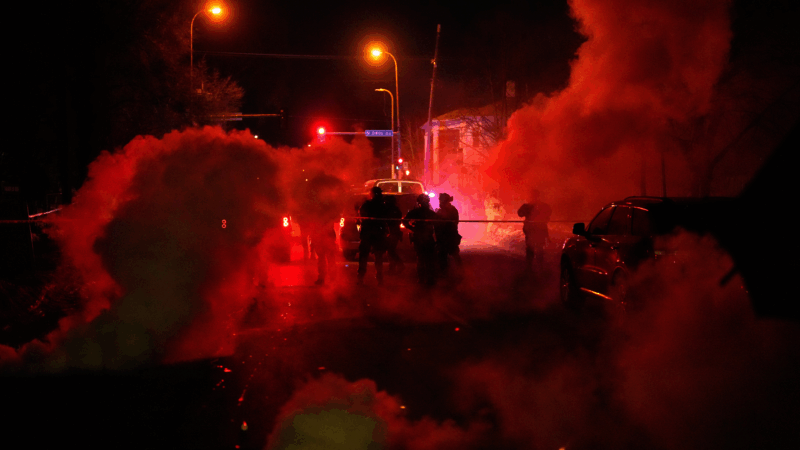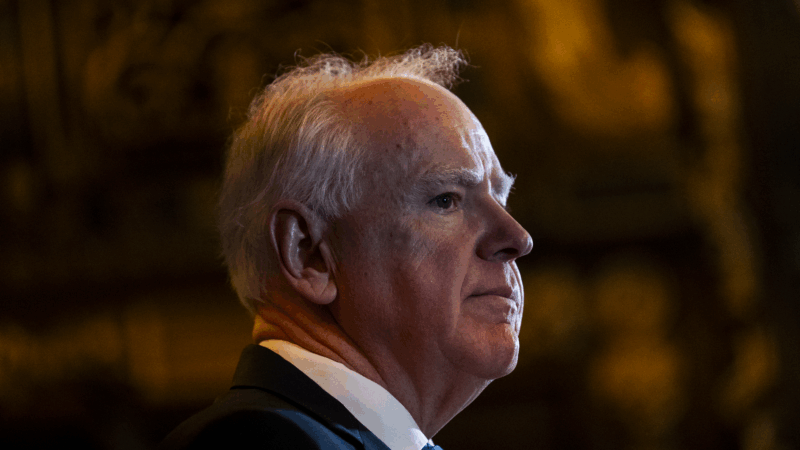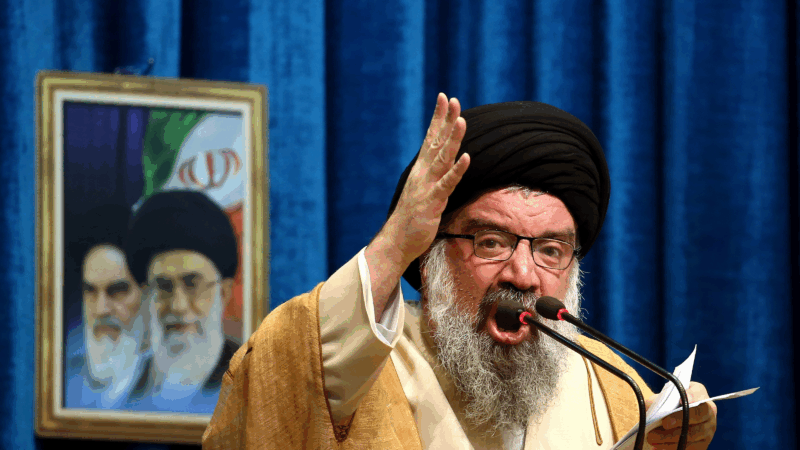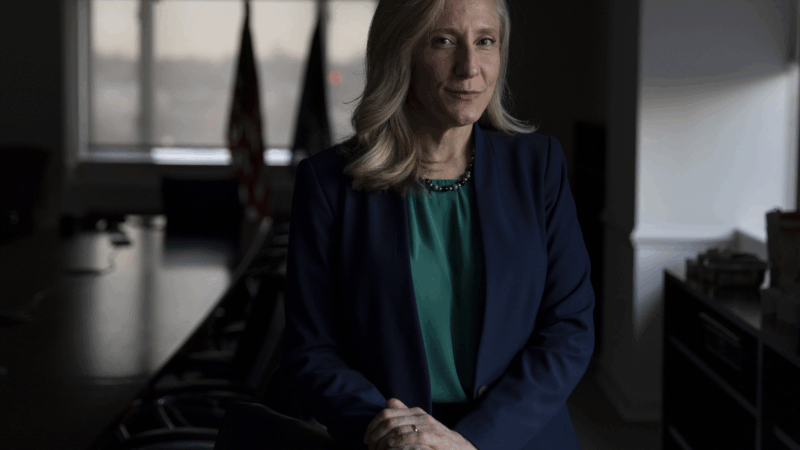Why CEOs are calm about tariffs in public — but ‘very discouraged’ in private
Wall Street is panic-selling over President Trump’s chaotic new tariffs. Business executives are reportedly making frantic calls to the White House. And on Tuesday, the country’s top CEOs crowded into a closed-door meeting with Trump — setting a record for attendance.
Yet in public, corporate America’s leaders are remaining calm — and even upbeat.
“The business community understands what the president is trying to do with tariffs,” Goldman Sachs CEO David Solomon told Fox News on Wednesday.
Solomon acknowledged that companies “always” want lower tariffs. But he was also careful to start his comments by praising Trump for being “engaged with the business community” — unlike, he added, the Biden administration.
The Goldman Sachs CEO was speaking a day after Trump met with him and other members of the Business Roundtable, an influential CEO group. The meeting followed two days of sharp losses in the U.S. stock market, in a $4 trillion (and ongoing) selloff, largely kindled by Trump’s words and actions: Since early March, Trump has implemented a flurry of steep new tariffs, reversed some of them, and shrugged off concerns over their economic impact.
When asked about the possibility of a recession, Trump demurred — in a reply that sparked this week’s market turmoil.
“There is a period of transition, because what we’re doing is very big. We’re bringing wealth back to America,” the president told Fox News in an interview that aired Sunday.
By mid-week, a handful of the most powerful CEOs had started to express concern — but even then, only in very mild terms.
“Uncertainty is not a good thing,” JPMorgan Chase CEO Jamie Dimon, who runs the country’s largest bank, said Wednesday at a conference hosted by the publication Semafor.
And Larry Fink, who runs investment giant BlackRock, told CNN that “the economy is weakening as we speak.”
Yet Fink was also quick to add that the Trump administration’s policies “can be very productive for the United States” in the long run.
A White House spokesperson on Thursday reiterated his statement to NPR from earlier this week.
“President Trump delivered historic job, wage, and investment growth in his first term, and is set to do so again in his second term,” White House spokesperson Kush Desai said by email.
Why America’s business leaders engage in delicate diplomacy
Corporate America’s careful rhetoric — even as many big companies brace for the impact of the market volatility and the tariffs — illustrates the delicate diplomacy that business leaders are trying to engage in. They largely welcome Trump’s other economic promises — including lower taxes and fewer regulations.
Business leaders also see limited benefits to criticizing the president in public, experts say. That’s a marked contrast from Trump’s first term, when some CEOs publicly resigned from White House advisory councils to protest the president’s handling of racist violence in Charlottesville, Va.
But eight years later, corporate America is much less willing to wade into public conversations about politics — or “social” issues that companies don’t see as directly related to their bottom lines.
Today, they’re more focused on the potential financial upsides of Trump’s new term. The president actively courted business interests during his campaign — and at first, corporate America seemed thrilled with the results of the election. CEO confidence soared to a three-year high last month, according to the Conference Board’s quarterly survey of the CEOs of the largest companies.
Now Trump’s stop-and-start tariff policies seem to be complicating many companies’ economic outlook. But business leaders are trying to avoid adding to investors’ financial panic, according to Anna Tavis, who chairs New York University’s department of human-capital management and talks to executives across corporate America.
She points out that part of a CEO’s job is to project confidence — in their own companies, in the markets and in the broader economy.
“They have no control over what the government is going to do, regardless of how they feel,” says Tavis.
And, she adds: “Obviously, they want to be on the winning side of whatever happens.”
80% of CEOs are “apologizing to our international partners”
Behind the scenes, the conversation is more candid. CEOs “are very discouraged,” says Jeffrey Sonnenfeld, an associate dean at the Yale School of Management, who hosted a gathering of CEOs on Tuesday.
80% of those CEOs say “that they find themselves apologizing to our international partners for Trump’s capriciousness,” Sonnenfeld told NPR’s Morning Edition on Thursday.
And, he added, “roughly 70% said the Trump administration is going to be bad for the economy.”
Those numbers are a sharp contrast to the Conference Board’s rosier findings last month. It regularly polls the heads of the largest U.S. companies, and it finished its latest survey on February 10 — after Trump had first announced, then first delayed, his new 25% tariffs against Mexico and Canada.
“I know people were surprised that we saw this increase in CEO confidence at the time that tariffs may [start to] have a negative impact on the economy,” Stephanie Guichard, senior economist at the Conference Board, told NPR last week.
Many of the CEOs surveyed in late January and early February did tell the Conference Board that they’re worried about tariffs, she added. But at the time, business leaders said they were more focused on Trump’s other, business-friendlier promises, including deregulation and lower taxes.
Still, Guichard is curious to see what CEOs tell the Conference Board in two months, when it next polls America’s business leaders.
“A lot can happen between now and May,” she says.
Transcript:
AILSA CHANG, HOST:
President Trump has now announced then delayed new tariffs several times. And if fully implemented, they are expected to lead to much higher prices, which would be bad for the U.S. economy. But many business leaders say they’re optimistic. NPR business correspondent Maria Aspan reports.
MARIA ASPAN, BYLINE: American businesses are feeling the whiplash of President Trump’s new tariffs against Canada, Mexico and China. Just listen to CNBC this week.
(SOUNDBITE OF MONTAGE)
EAMON JAVERS: The president said those 25% tariffs will go into effect tomorrow.
UNIDENTIFIED REPORTER: The White House will be giving automakers – any cars in North America – a one-month delay on the tariffs that they had just announced this week.
MEGAN CASSELLA: Some major tariff relief coming for Mexico, at this point. The president…
ASPAN: So corporate America, like the rest of us, doesn’t know what to expect. On Wall Street, markets swung up and down this week.
ANNA TAVIS: Businesses don’t like uncertainty.
ASPAN: Anna Tavis runs NYU’s Department of Human Capital Management, where she talks to executives across corporate America. And as she points out, there’s been a lot of uncertainty. Some businesses are really worried about the tariffs becoming permanent, especially the automakers, retailers and other consumer-facing companies that would be directly affected. This week, Best Buy CEO Corie Barry warned that price increases for American consumers are, quote, “highly likely.”
CORIE BARRY: We’ve never seen this kind of breadth of tariffs, and this, of course, impacts the whole industry.
ASPAN: Yet at the same time, business leaders have been saying they feel pretty great about the economy in general. In fact, CEO confidence is at a three-year high, according to The Conference Board. It regularly polls the heads of the largest U.S. companies, and it finished its latest survey on February 10, after Trump had first announced, then first delayed, the details of his new tariffs.
STEPHANIE GUICHARD: I know people were surprised that we see this increase in CEO confidence at the time that tariffs may have a negative impact on the economy.
ASPAN: That’s Stephanie Guichard. She’s a senior economist at The Conference Board, and she says that many of the CEOs surveyed said they were worried about tariffs, but they’re more focused on Trump’s other business-friendly promises.
GUICHARD: They are not thinking so much about tariffs. They are thinking about deregulation. They are thinking about lower taxes.
ASPAN: Take Goldman Sachs CEO David Solomon. When he talked to CNBC right after Trump’s inauguration, he called the impact of tariffs – yep – uncertain. But he also said this…
(SOUNDBITE OF ARCHIVED RECORDING)
DAVID SOLOMON: The U.S. economy is in pretty good shape, and it’s not going to be a smooth, perfect path. But people are optimistic that we are going to run a more growth-prone agenda.
ASPAN: Meanwhile, NYU’s Tavis points out that there are big risks and limited rewards for executives who publicly criticize Trump or his policies. And in general, she says, part of a CEO’s job is to project confidence in their own businesses, in the markets and in the broader economy.
TAVIS: They have no control over what the government is going to do, regardless of how they feel. Obviously, they want to be, you know, on the winning side of whatever happens.
ASPAN: So CEOs have good reasons to look for the upside, while they and everyone else, waits to see what actually happens next.
Maria Aspan, NPR News, New York.
(SOUNDBITE OF MUSIC)
Judge rules immigration officers in Minneapolis can’t detain peaceful protesters
Officers in the Minneapolis-area participating in a U.S. immigration enforcement operation can't detain or tear gas peaceful protesters who aren't obstructing authorities, a judge ruled Friday.
Justice Department opens investigation into Minnesota governor and Minneapolis mayor
Federal prosecutors are investigating Gov. Tim Walz and Mayor Jacob Frey.
No sign of new protests in Iran as a hard-line cleric calls for executions
A Iran returns to an uneasy calm after protests led to a violent crackdown, a senior cleric is calling for the death penalty for detained demonstrators. His sermon Friday also threatened U.S. President Trump.
Gulf South food banks look back on a challenging year as another shutdown looms
Federal funding cuts and a 43-day government shutdown made 2025 a chaotic year for Gulf South food banks. For many, the challenges provide a road map for 2026.
Measles is spreading fast in S.C. Here’s what it says about vaccine exemptions
More than 550 people have contracted measles in Spartanburg County, S.C., in a fast-growing outbreak. Like a majority of U.S. counties, nonmedical exemptions to school vaccination are also rising.
It took 75 governors to elect a woman. Spanberger will soon be at Virginia’s helm
Abigail Spanberger, a former CIA officer and three-term congresswoman, is breaking long-held traditions on inauguration day. She says she wants her swearing-in to showcase the state's modern vibrancy.







